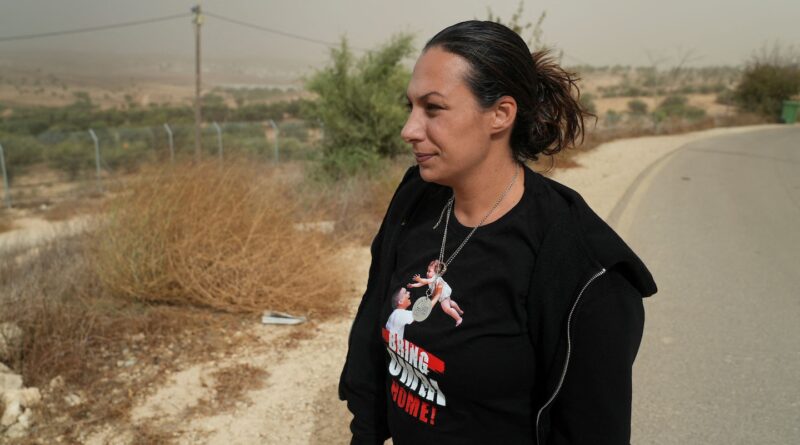An Oct. 7 survivor lives in fear for her husband, a hostage in Gaza
“We thought there was going to be something — but not what happened, of course,” she said.
Lavi, 38, woke up the morning of Oct. 7 to notifications from Red Alert, the Israeli warning system. Such was life near the border with Gaza. She had lived on the kibbutz — one of the hundreds of Israeli communities founded as commune-like collectives in years past — for decades and was used to rocket interceptions and other signs of conflict.
She and her husband, Omri Miran, 46, brought their then-6-month-old daughter, Alma, to the safe room in their home, where 2-year-old Roni was sleeping. Lavi soon heard from others in the kibbutz that Hamas militants had crossed the border and were in the streets. “Something bigger” was happening, she realized.
Later that day, she and her children would sit in fear, unaware of the scale of the terror spreading through the kibbutz — and across parts of southern Israel.
At least 1,200 Israelis died in the Hamas attack, Israel says, with more than 200 believed to be taken hostage by Hamas. Miran was one of them.
Around 8 a.m., Lavi heard gunfire in the neighborhood and ran to the kitchen to grab two knives. Two hours later, she could hear men outside the house. The petrified family heard glass break as militants broke into the home.
Militants knocked on the door of the safe room, yelling at the family to open it or be shot. The family heard a familiar voice: A boy who lived nearby, Tomer, told them in Hebrew, “Please open the door, otherwise they’ll shoot me and they’ll shoot you.”
Lavi and Miran looked each other in the eye and agreed to open the door. “I don’t know if it was the right thing or not,” she said.
The militants took Lavi, Miran and baby Alma to the kitchen as Roni slept in the safe room. After Lavi begged the militants to let her get Roni, the men took Tomer to fetch her. The toddler woke up to brandished guns, Lavi said.
The captives were brought to a neighbor’s home, where militants held them and others. That was the last the captives saw of Tomer, who Lavi later learned was killed.
Two American women were brought into the home. About 10 minutes later, the militants departed, taking the Americans, Miran and the father from that household with them.
In her final moments with her husband, Lavi says, she told him four things: “I love you. I’m waiting for you. I’ll guard over our daughters. And don’t be a hero.”
Roni, who had remained quiet, ran after her father as he was taken away. “She wanted to go with him,” Lavi said.
For hours, what remained of the two families sat in silence, amid gunfire and screams, until Israeli soldiers found them.
They emerged to burning cars and trees.
Miran, a dual Hungarian-Israeli national, worked in the kibbutz as a gardener and massage therapist. “He’s a therapist for trees and for people,” Lavi said. She described him as an optimist who smiles all the time and an avid basketball fan.
“Every Thursday is his night to watch the game,” Lavi said.
After weeks of wondering whether Miran was alive, Lavi said, she learned in late November that he was. She does not know anything about his health, his condition or what he has been eating, she said.
The freeing of more than 100 hostages — among them Israelis and foreigners, mostly women and children — negotiated amid a week-long pause in hostilities raised hope that more releases would be possible, but hostilities resumed Dec. 1 without the release of most male Israeli hostages. Of the 138 people believed to be held by Hamas, 118 are men, the Israeli prime minister’s office said this month.
As hostilities have intensified in Gaza’s south, fear for the remaining hostages has only grown.
Miran probably doesn’t know that his wife and children are still alive, Lavi said. “I’m sure in his mind, he’s thinking: What happened to us?”
Lavi said she’s “really happy” for the freed hostages and their loved ones. One of the women released was a childhood friend, she said. “On the other hand,” Lavi said, “we are always thinking about the men, how strong they are.”
The men held by Hamas are “children, fathers, brothers, husbands,” she added. “Omri is first a father.”
Hamas had signaled its openness to freeing civilian male hostages if the pause was extended. U.S. officials said Hamas made an extension impossible by refusing to release its remaining female hostages.
Lavi said Roni has been saying “daddy got lost” as she tries to make sense of why she hasn’t seen her father for nearly two months.
“Me and my two daughters, we are still hostage,” Lavi said. “We are physically in better conditions, of course, but in our head, in our soul, we are mentally hostages of Hamas still, until Omri comes back.”




